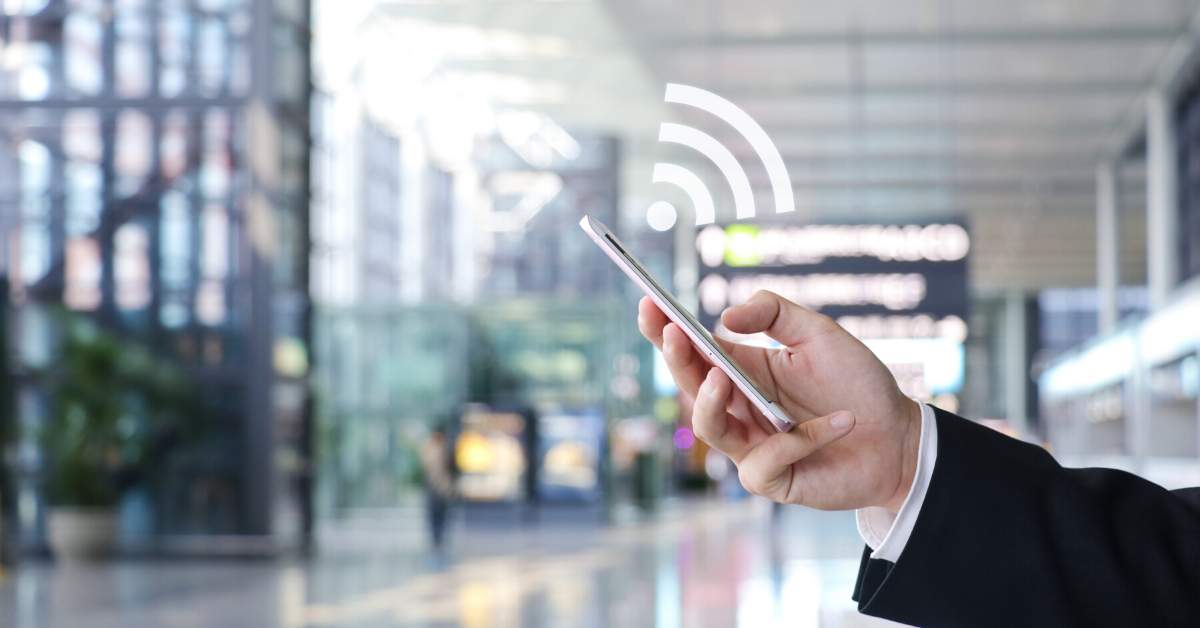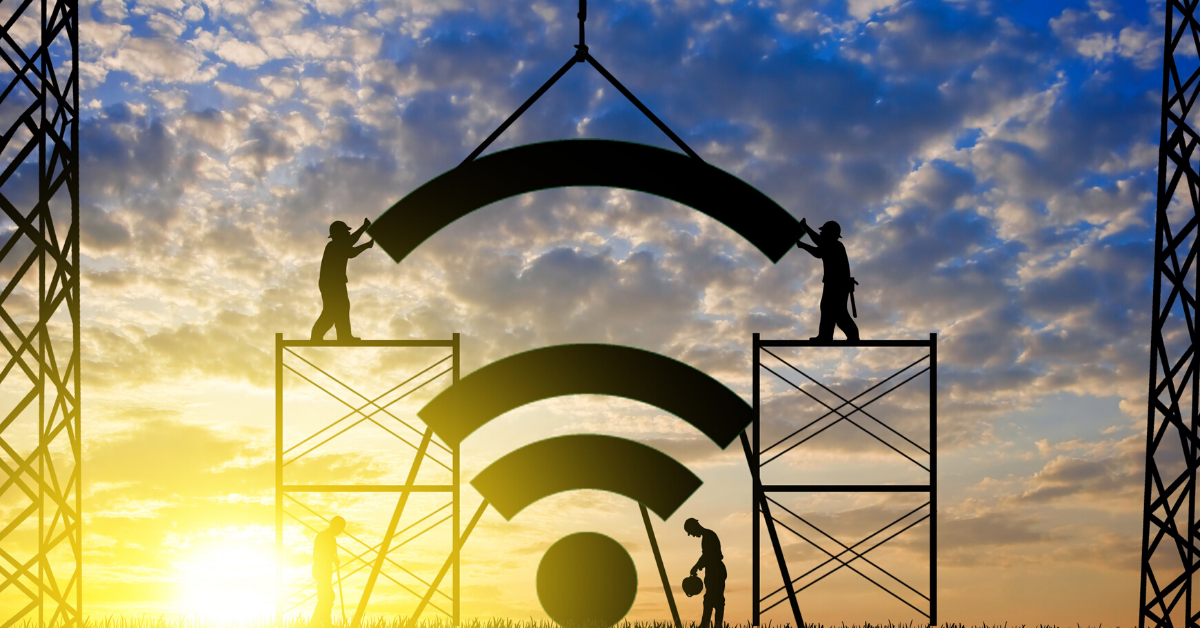
WiFi is the most used tool to get access to the Internet. Nowadays, WiFi is available in any place no matter where you go, including a coffee shop, restaurant, hotel, shopping mall, and airport and it’s so easy for people to use that it gradually becomes a tool taken advantage of by hackers as well. Then, is your WiFi secure? You should find it out.

WiFi vs. Internet
WiFi is a tunnel to the Internet, it’s not the Internet though.
Since the Internet can be reached through a WiFi connection, most of us believe WiFi equals to the Internet. However, it’s not true.
As we get connected with WiFi using our devices, we’ll be able to get access to the Internet. However, WiFi and Internet are totally different things. Internet is a database full of numerous information and WiFi is a tunnel to lead people to the Internet “world”.
To make your device connect to the Internet, you should first connect your device with a WiFi router that is linked to the Internet. As soon as your device gets connected with the WiFi router, your device will be connected to the Internet.
As we use the Internet, we can get on it through wires, mobile data, or WiFi. Therefore, WiFi is just a tunnel to the Internet but it’s not the Internet.
Personal WiFi or Public WiFi, which is More Secure?
To be honest, neither is secure if you lack sufficient privacy protections.
Generally speaking, there are two types of WiFi people usually use personal WiFi and public WiFi.
Personal WiFi refers to the WiFi router established in your home and it’s specifically used by you and your family living with you. As a password is set by you, only you and your family are allowed to get connected to it.
Public WiFi, however, is the WiFi router or other types of network connection provided by public places like coffee shops, restaurants, hotels, shopping malls, or airports. Not only you, anyone is accessible to it as long as they are within the WiFi range. Usually, you can directly get access to the Internet through public WiFi that calls for no requirement for a password or an extremely easy password such as 123456.
Personal WiFi or public WiFi, which is more secure? To be honest, neither is secure if you don’t make sufficient privacy protections. Public WiFi is undoubtedly risky because it’s accessible to everyone and all the information you send and receive between you and the Internet is “naked”. In the case of personal WiFi, if you don’t use a password or a simple password, your WiFi is also accessible to some guys and your privacy will be exposed to them. Dangerous, eh?
What Risks You’ll Suffer from if Unsecure WiFi is Used
Personal Information Theft
The biggest network risk you’ll suffer from when insecure WiFi is used is personal information theft, which is also the leading purpose of network hackers. As you use insecure WiFi hotspots to access the Internet, all your online activities will be exposed. The worse result will occur when you get online shopping using a credit card. All the information about your privacy including account name and password will be known if insecure WiFi is used to get access to the Internet.
Unencrypted Network
Encryption refers to the action of encrypting all the information transmitted between your device and wireless router so that the information fails to be read by people who don’t hold a password. The encryption feature is usually disenabled by default, so it should be enabled by you as the network was first started.
“Masked” Unsecure WiFi
As you’re sitting in Starbucks and would like to go through your Instagram on your phone, a WiFi list can be seen with a WiFi network called “Starbucks Public WiFi”. Will you connect it? Perhaps “why not” is your answer. Since the WiFi is provided by Starbucks, how come is it insecure? Wait a moment. Are you sure the WiFi network is really provided by Starbucks? It depends. Some hackers create such a name just to seduce people to connect it so that their personal information can be stolen.
Infected by Malicious Software
As all your online activities get exposed to the Internet, it’s possible for you to be attacked by malicious software that is secretly implanted to your laptop or phone. As a result, it’ll take few efforts for hackers to compromise your online security and privacy since a “tracker” has been installed on your device, sending your personal information out to hackers.

What Should be Done to Secure Your WiFi?
Just as what is discussed above, neither personal WiFi nor public WiFi is secure unless effective measures are made to protect your cybersecurity and privacy. Based on different types of WiFi, different measures are suggested.
Some Tips for You When Personal WiFi is Used
Use a strong password for your WiFi router
Say no to strangers to access to your WiFi
Remember to change your WiFi password frequently
Use a VPN for network encryption
Enable your firewall and update it to the latest version
Turn off your WiFi network when you’re not home or absent for days
Don’t share your WiFi password to strangers
Some Tips for You When Public WiFi is Used
Can’t I use public WiFi based on its insecurities?
Don’t worry, however. Public WiFi can be safe and secure as long as useful public WiFi tips are used while using it.
Tip#1. Get an Access to a Secure WiFi
As you stay in public places, make sure the public WiFi you’ll connect with is truly safe. It’s too difficult honestly because you’ll never know how secure it is unless you get connected with it. To guarantee the security, you’re suggested to ask the staff working there to ensure whether there’s an “official” public WiFi. Remember, NEVER connect a random WiFi.
Tip#2. Visit Secure Websites
Enter https websites that can encrypt all the information no matter that’s you send, or you receive. HTTPS can guarantee the security of the communication between your device and some websites. In addition, it’s best to enter URL by yourself instead of entering a given website.
Tip#3. Don’t Visit Personal Bank Account or Sensitive Personal Information
It’ll be the most dangerous to visit your personal bank account or sensitive personal information concerning your privacy such as financial or medical accounts based on public WiFi. Therefore, you should seriously evaluate the risk of doing so.
Tip#4. Don’t Leave Your Devices Alone at Public
Never leave your laptop, tablet, or mobile phone alone in public. Even if you’re using the most secure WiFi, it’s still possible that your belongings or privacy will be snooped.
Tip#5. Don’t Set Your Device to be Automatic Connection
The automatic WiFi connection is so risky that if it is a truly insecure WiFi hotspot, it’ll get connected with your device automatically within its range. The process can take place so fast even without your awareness.
Tip#6. Use a VPN
The advantage of using a VPN is that you don’t need to worry about insecure WiFi. With a VPN connection, you just go through the Internet without any concern about security or privacy.
The last word, the Internet is wonderful but full of hidden risks as well. The only principle for you to conform to is to keep alert whenever you’re using the Internet and to keep knowledgeable about cybersecurity and privacy protection.
